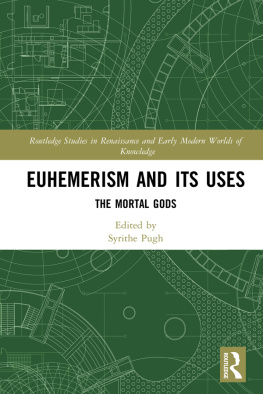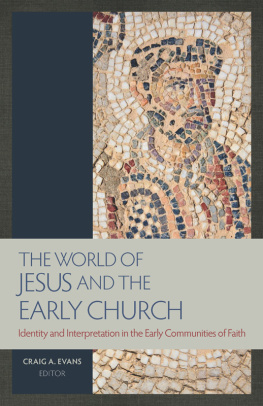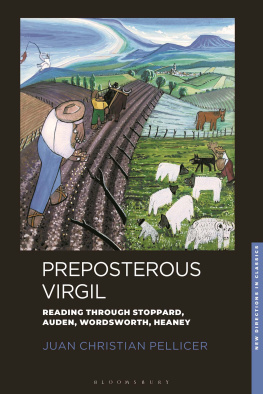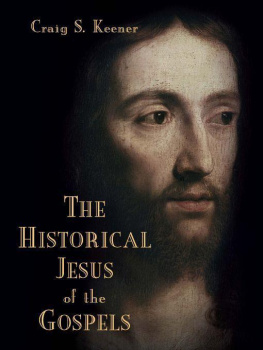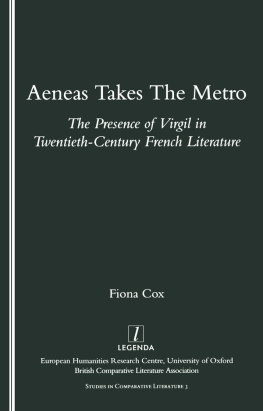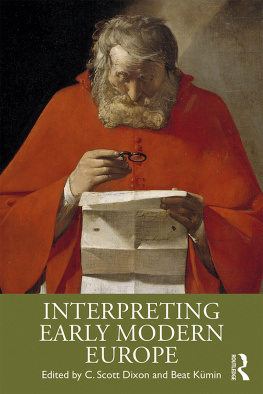
The Virgilian Tradition II
The Virgilian Tradition II brings together thirteen essays by historian Craig Kallendorf.
The essays present a distinctive approach to the reception of the canonical classical author Virgil, which is focused around the early printed books through which that author was read and interpreted within early modern culture. Using the prefaces, dedicatory letters, and commentaries that accompanied the early modern editions of Virgils Eclogues, Georgics, Aeneid, and Appendix Virgiliana, they demonstrate how this paratextual material was used by early readers to develop a more nuanced interpretation of Virgils writings than twentieth-century scholars believed they were capable of. The approach developed throughout this volume shows how the emerging field of book history can enrich our understanding of the reception of Greek and Latin authors.
This book will appeal to scholars and students of early modern history, as well as those interested in book history and cultural history.
Craig Kallendorf is Professor of English and Classics at Texas A&M University, where he has taught since 1982. He is the author or editor of 27 books and more than 170 articles, book chapters, and reference work entries.
Also in the Variorum Collected Studies series:
CRAIG KALLENDORF
The Virgilian Tradition II
Books and Their Readers in the Renaissance (CS1103)
TERENCE OREILLY
Humanism and Religion in Early Modern Spain
John of the Cross, Francisco de Aldana, Luis de Len (CS1102)
DORINDA OUTRAM
Science, Enlightenment and Revolution
Selected Papers, 19762019 (CS1101)
BRIAN CROKE
Roman Emperors in Context
Theodosius to Justinian (CS1100)
STEPHEN KNIGHT
Medieval Literature and Social Politics
Studies of Cultures and Their Contexts (CS1099)
EKMELEDDIN HSANOGLU
Studies on Ottoman Science and Culture (CS1098)
DAVID S. BACHRACH and BERNARD S. BACHRACH
Writing the Military History of Pre-Crusade Europe
Studies in Sources and Source Criticism (CS1097)
PAMELA M. KING, edited by Alexandra F. Johnston
Reading Texts for Performance and Performance as Texts
Shifting Paradigms in Early English Drama Studies (CS1096)
FELICE LIFSHITZ
Writing Normandy
Stories of Saints and Rulers (CS1095)
STEPHEN GERSH
Metaphysics and Hermeneutics in the Medieval Platonic Tradition (CS1094)
For more information about this series, please visit: https://www.routledge.com/Variorum-Collected-Studies/book-series/VARIORUM
First published 2022
by Routledge
2 Park Square, Milton Park, Abingdon, Oxon OX14 4RN
and by Routledge
605 Third Avenue, New York, NY 10158
Routledge is an imprint of the Taylor & Francis Group, an informa business
This edition 2022 Craig Kallendorf
The right of Craig Kallendorf to be identified as author of this work has been asserted by him in accordance with sections 77 and 78 of the Copyright, Designs and Patents Act 1988.
All rights reserved. No part of this book may be reprinted or reproduced or utilised in any form or by any electronic, mechanical, or other means, now known or hereafter invented, including photocopying and recording, or in any information storage or retrieval system, without permission in writing from the publishers.
Trademark notice: Product or corporate names may be trademarks or registered trademarks, and are used only for identification and explanation without intent to infringe.
British Library Cataloguing-in-Publication Data
A catalogue record for this book is available from the British Library
Library of Congress Cataloging-in-Publication Data
A catalog record for this book has been requested
ISBN: 978-0-367-71042-2 (hbk)
ISBN: 978-0-367-71043-9 (pbk)
ISBN: 978-1-003-14905-7 (ebk)
DOI: 10.4324/9781003149057
Typeset in Times New Roman
by Apex CoVantage, LLC
VARIORUM COLLECTED STUDIES SERIES CS1103
CONTENTS
PART 1
Renaissance readings of Virgil
1 Allusion as reception: Virgil, Milton, and the modern reader
2 Historicizing the Harvard school: pessimistic readings of the Aeneid in Italian Renaissance scholarship
3 Representing the other: Ercillas La Araucana, Virgils Aeneid, and the New World encounter
4 Epic and tragedy Virgil, La Cerda, Milton
5 Nicodemus Frischlins Dido: Virgil on the German stage
6 The Neo-Latin epic
PART 2
Early books and manuscripts, mostly Virgilian
7 The medium is the message: from manuscript to the hand press to the computer age
8 Using manuscripts and early printed books
9 A humanist annotator of Virgil: Coluccio Salutati
10 Virgil and printed books, 15001800
11 Virgil and the ethical commentary: philosophy, commonplaces, and the structure of Renaissance knowledge
12 Virgil in the Renaissance classroom: from Toscanellas Osservationi sopra lopere di Virgilio to the Exercitationes rhetoricae
13 Canon, print, and the Virgilian corpus
- Part 1 Renaissance readings of Virgil
- 1 Allusion as reception: Virgil, Milton, and the modern reader
- 2 Historicizing the Harvard school: pessimistic readings of the Aeneid in Italian Renaissance scholarship
- 3 Representing the other: Ercillas La Araucana, Virgils Aeneid, and the New World encounter
- 4 Epic and tragedy Virgil, La Cerda, Milton
- 5 Nicodemus Frischlins Dido: Virgil on the German stage
- 6 The Neo-Latin epic
- Part 2 Early books and manuscripts, mostly Virgilian
- 7 The medium is the message: from manuscript to the hand press to the computer age
- 8 Using manuscripts and early printed books
- 9 A humanist annotator of Virgil: Coluccio Salutati
- 10 Virgil and printed books, 15001800
- 11 Virgil and the ethical commentary: philosophy, commonplaces, and the structure of Renaissance knowledge
- 12 Virgil in the Renaissance classroom: from Toscanellas Osservationi sopra lopere di Virgilio to the Exercitationes rhetoricae
- 13 Canon, print, and the Virgilian corpus
Guide
Every effort has been made to contact the original publishers of the essays in this collection, but this has not been possible in every case. The original places of publication for the essays in this collection are listed here. All essays are reprinted with permission.
Allusion as Reception: Virgil, Milton, and the Modern Reader, in Classics and the Uses of Reception, ed. Charles Martindale and Richard Thomas (Oxford: Blackwell, 2006), 6779.
Historicizing the Harvard School: Pessimistic Readings of the Aeneid in Italian Renaissance Scholarship, Harvard Studies in Classical Philology 99 (1999): 391403.
Representing the Other: Ercillas La Araucana, Virgils Aeneid, and the New World Encounter, Comparative Literature Studies 40 (2003): 394414. Copyright 2003 The Pennsylvania State University Press. This article is used by permission of The Pennsylvania State University Press.
Epic and Tragedy Virgil, La Cerda, Milton, in


